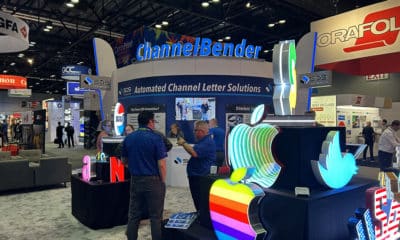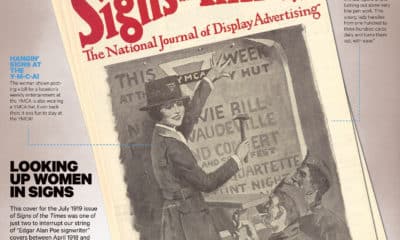Eric Smalley, in the May 2003 issue of Technology Research News, reported that E Ink Corp. (Cambridge, MA) had developed a 96-dpi, 0.3mm-thick electronic display. The announced display s resolution is equal to that found in palmtops — 96 dpi — plus, the flexible screen s thickness equates to a credit card. It has a 180° viewing angle, and you can bend it into relatively tight curves. These features make it useful for various applications, including electronic digital signage (EDS). Founded in 1997, E Ink Corp. lists Toppan Printing Co., Royal Philips Electronics, the Hearst Corp., CNI Ventures, Air Products and Chemicals Inc., Motorola and Vossloh Information Technologies (Vossloh IT), as investors and/or strategic partners. In July 2004, E Ink Corp. revealed that its joint development agreement with Vossloh IT (Kiel, Germany), a limited-liability company owned by Vossloh Group (also of Kiel), has produced a commercial product for transportation information displays. The E Ink/Vossloh electronic-ink system has the changeable versatility of other EDS systems and the optical quality of printed material. It s lightweight, has high contrast and is readable in direct sunlight. It also offers much lower, overall life-cycle costs than other traditional display systems, and its low power requirements make it valuable for onboard information systems. Vossloh IT presently uses LCD, LED, plasma and CRT display technologies, but, because of its inherent simplicity, the electronic-ink displays fit neatly into Vossloh s passenger-information system packages, fixed or mobile. Vossloh s electronic-ink, applicable EDS systems include fixed identification and information systems, terminal identifiers, exterior vehicle-identification systems (train, coach and destination information), interior seat-reservation panels, and route, speed, time, safety, emergency and general information displays. Vossloh IT is currently testing prototypes in Germany; it plans to have units in place by summer, with large-scale production starting in April. The German Federal State of Berlin and European Regional Development Fund is sponsoring the development project, with research support from Berlin s Fraunhofer Institute for Reliability and Microintegration ISM. Vossloh Group is one of Europe s leading suppliers of railway systems technology. The group employs approximately 4,400 people worldwide, with operations in Germany, France, Benelux, Spain, Britain and Poland, as well as business relationships with rail and traffic operators throughout Europe, North America and Asia. Its forecast for 2004 sales is roughly $1 billion, with earnings reaching approximately $62 million. The company s various divisions manufacture diesel locomotives, track sections, rail fasteners and switching systems. Vossloh IT s three main fields are: passenger-information systems for urban public transport, national railways and airports (it equips trams and trolleys with related technology systems, and it supplies train-passenger information, protection and warning systems); planning, management and simulation systems for transport companies; and electronic interlocking, signaling technology systems. It s a primary supplier of advanced automation and control technology for Europe s rail systems with sales offices in Berlin, Zurich, Vienna and Budapest. Vossloh IT employs approximately 300 people, mostly IT specialists and engineers experienced in railway technology. Vossloh IT also develops and creates standardized interfaces, procedures and client-server architecture for its display sytems. Additionally, it integrates communications electronics and software. The development team has also optimized backplane materials, and integrated mechanical and environmental protective filters (for UV, infrared and humidity protection) into the displays. In other areas, E Ink has collaborated with Royal Philips Electronics, a provider of display technologies, and Sony Electronics to announce the first consumer application of an electronic-paper display (book) module: LIBRIe. Sony says LIBRIe can store up to 500 downloaded books and enables you to read approximately 10,000 pages before battery replacement (four AAA alkaline) is necessary. The Sony system offers 400 titles that expire after 60 days. It weighs approximately half a pound and costs $380. Other companies investing in similar technologies include Xerox s Gyricon subsidiary, Kodak and IBM.



 Photo Gallery1 week ago
Photo Gallery1 week ago
 Ask Signs of the Times2 weeks ago
Ask Signs of the Times2 weeks ago
 Paula Fargo1 week ago
Paula Fargo1 week ago
 Real Deal4 days ago
Real Deal4 days ago
 Photo Gallery1 week ago
Photo Gallery1 week ago
 Women in Signs2 weeks ago
Women in Signs2 weeks ago
 Women in Signs1 week ago
Women in Signs1 week ago
 Signs of the Times1 week ago
Signs of the Times1 week ago










